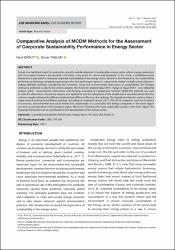Comparative Analysis of MCDM Methods for the Assessment of Corporate Sustainability Performance in Energy Sector
Citation
Ersoy, N. & Taslak, S. (2023). Comparative Analysis of MCDM Methods for the Assessment of Corporate Sustainability Performance in Energy Sector . Ege Academic Review , 23 (3) , 341-362 . DOI: 10.21121/eab.986122Abstract
Energy is a significant input for production, growth, and development. A sustainable energy sector, where energy production and consumption balance are ensured, constitutes a key point for nature and humanity. In this study, a multidimensional framework is presented to measure corporate sustainability in the energy sector. Based on this framework, the sustainability performance of energy companies operating in the Asia and Europe regions is measured by hybrid multiple-criteria decision-making (MCDM) methods, considering the economic, social and environmental dimensions of sustainability. The Entropy method is preferred to specify the criteria weights, the Proximity Indexed Value (PIV) -Range of Value (ROV) -Grey relational analysis (GRA) -Measurement Alternatives and Ranking according to Compromise Solution (MARCOS) methods are used to rank the alternatives. Sensitivity analysis was applied to test the robustness of the model and it was determined that the criterion weights obtained by different methods had different effects on the rankings. The Copeland method is used to obtain a single rational ranking from different rankings. According to Copeland's results, EN13, EN3, EN10 companies took the first place in economic, environmental and social dimensions, respectively. It is concluded that energy companies in the Asian region are more sustainable than in the European region. Moreover, Thailand is the most sustainable country in the Asian region. The proposed framework can be contributed to the development of the energy sector.


















